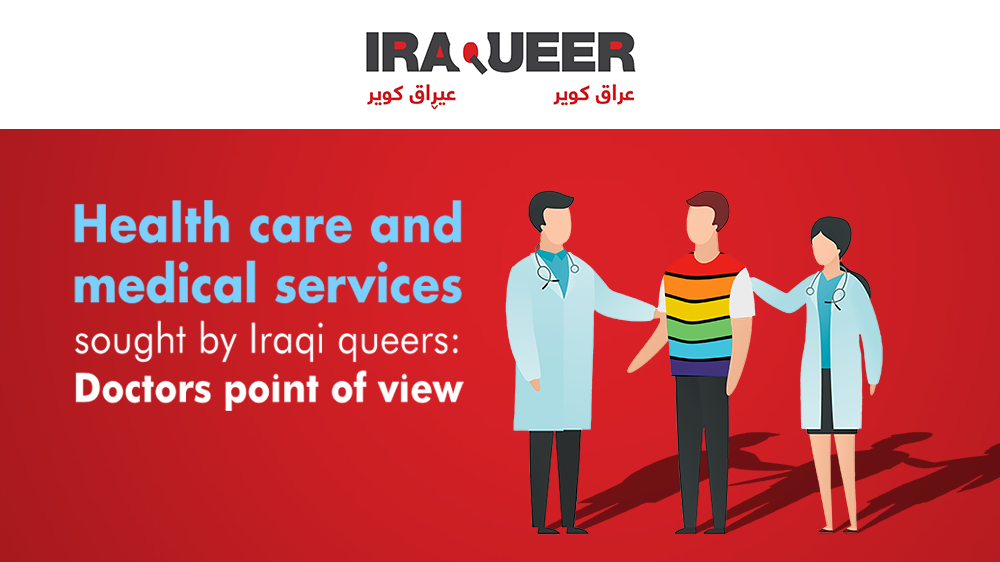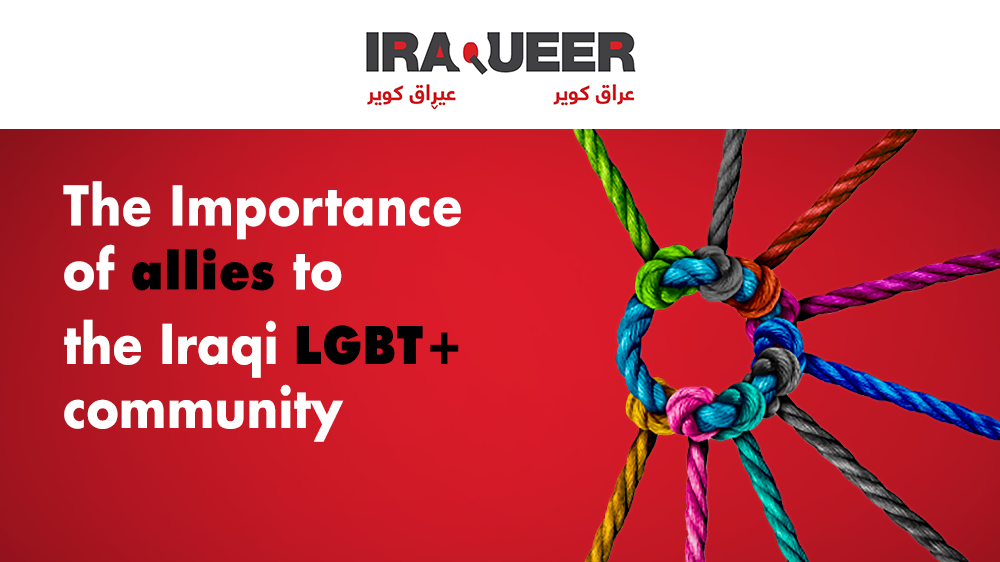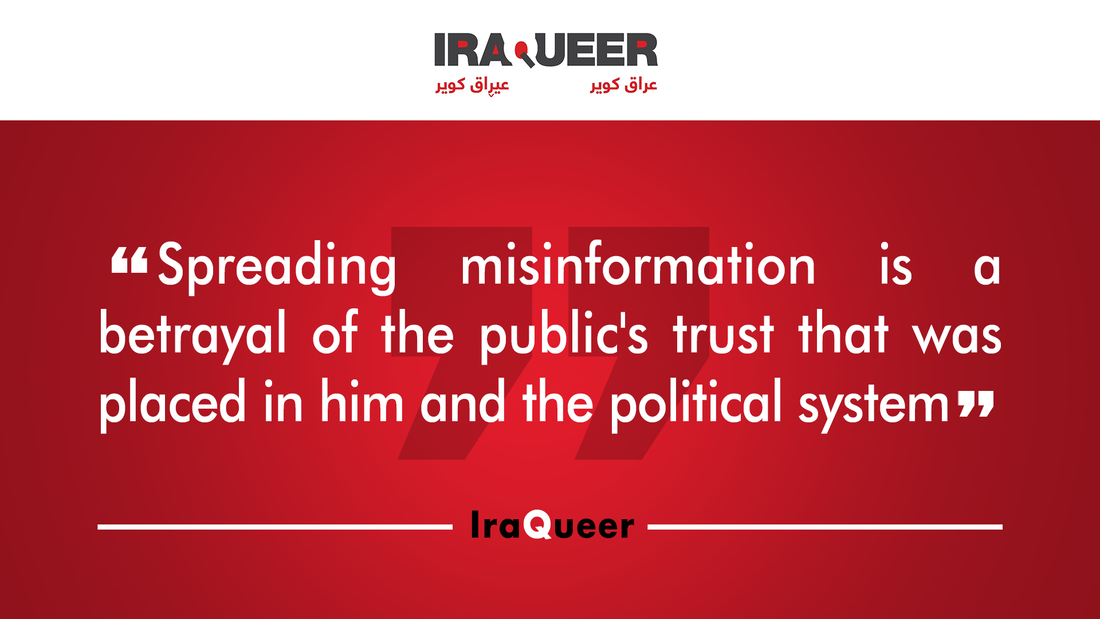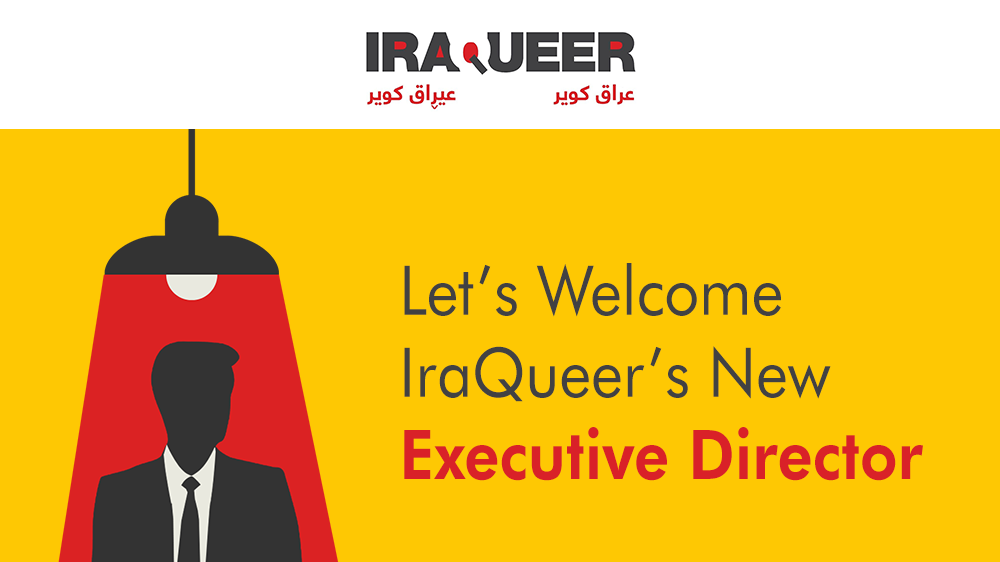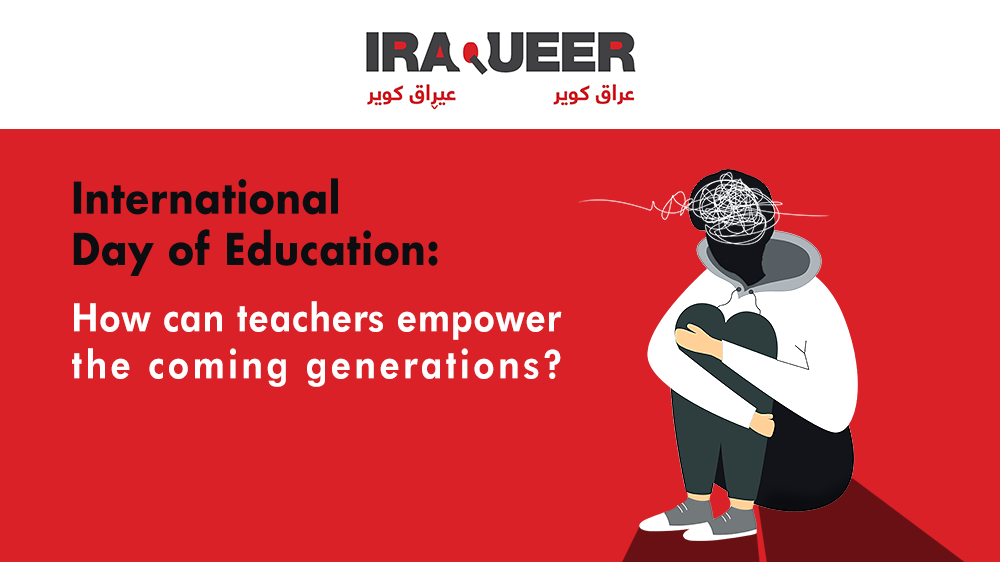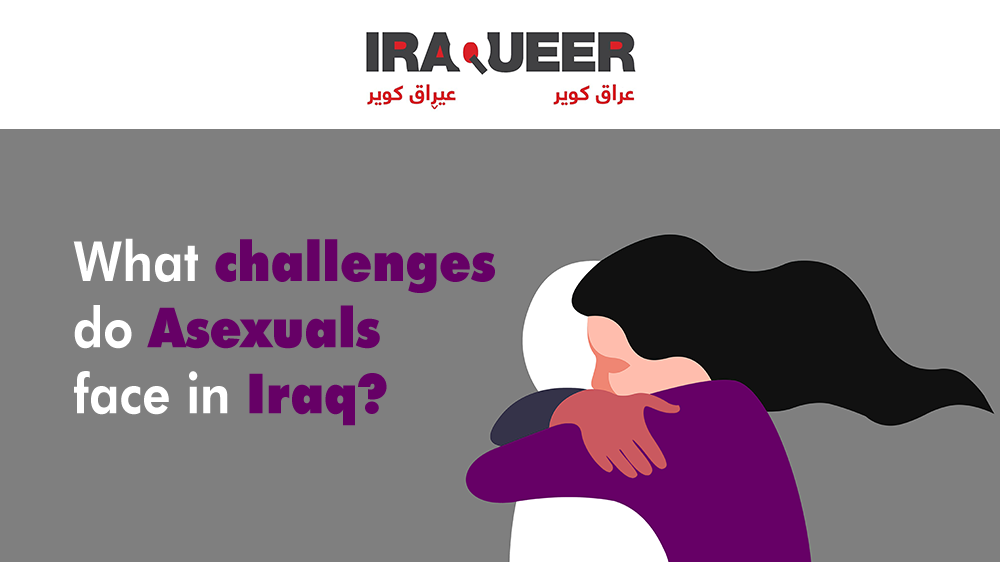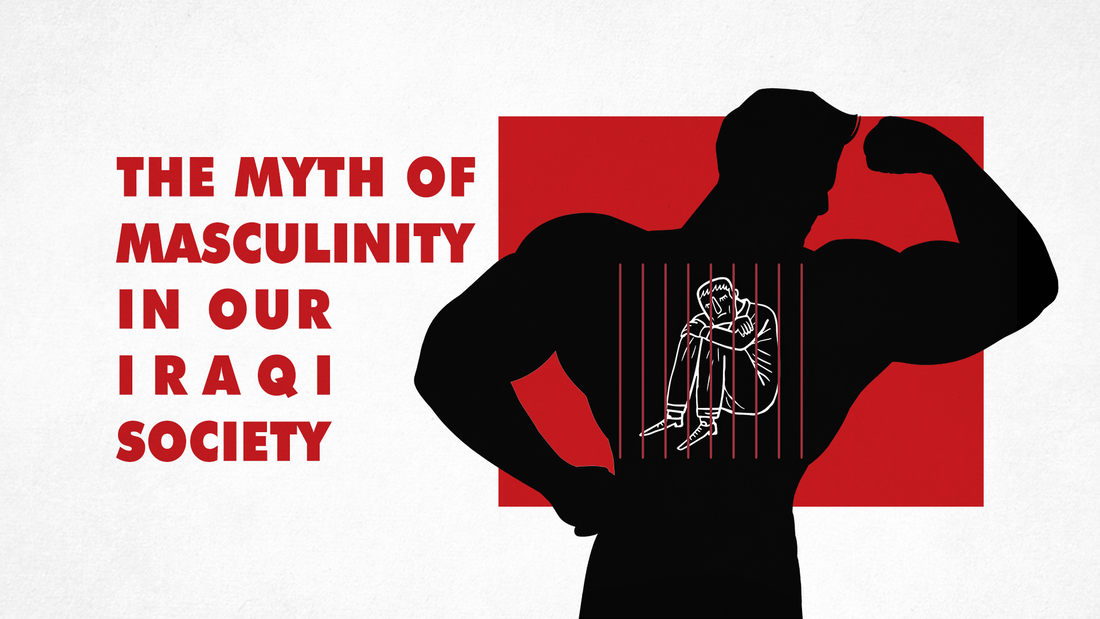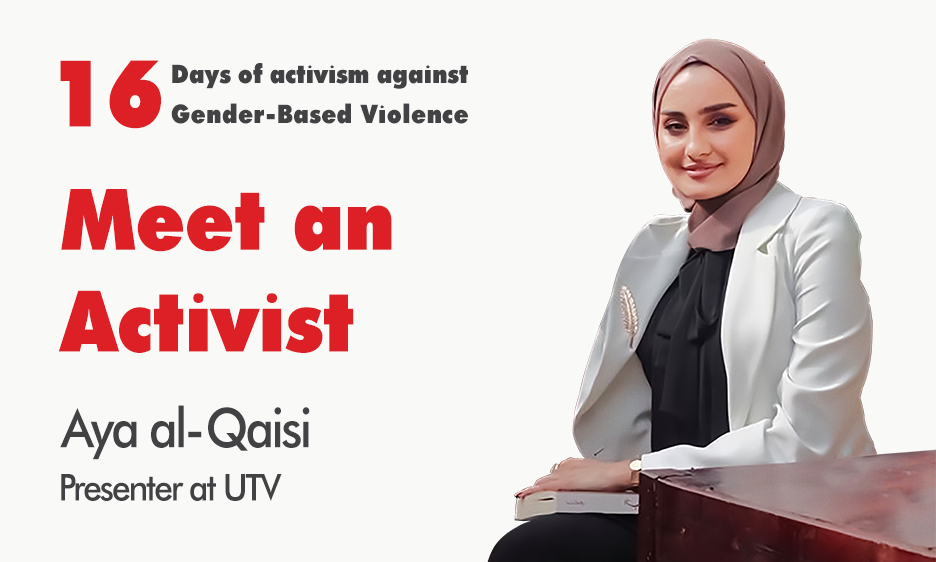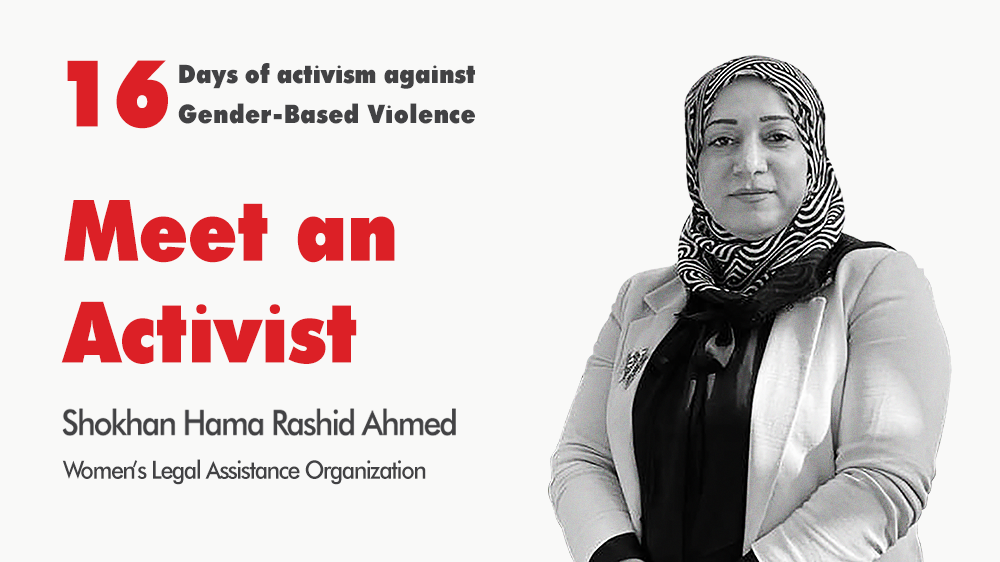|
In general, medical care in Iraq isn’t the best compared to other countries and with having homophobia spread among doctors, nurses, and pharmacists who work in the hospitals, the medical needs of the Iraqi LGBT+ community are rarely met.
When we talk about health issues, we don’t mean simple tooth pain or flu. LGBT+ members need surgeries, STD tests, or mental health services that are unavailable anywhere in the country. For that, most homosexuals avoid visiting doctors or when they do, they avoid telling them about their sexuality because some doctors don’t only refuse to offer their help but also put the patients in more trouble and cause stress by insulting them or threatening them. IraQueer tells the story of two Iraqi doctors who are willing to offer their medical help to all Iraqis from the LGBT+ community and they hope that their help is going to solve some problems and inspire other doctors to start offering the same kind of help. Dr. Angelo (Fake name) is an Iraqi medical student, who studies General Medicine and Surgery at the University of Baghdad, tells his story of how he started offering help to the LGBT+ community. “About eight years ago, I started my journey as an advocate in multiple organizations like World Merit. During that time I used to provide advices and spread awareness among LGBT+ people who were mostly relatives. That moral support then grew to become something different after I became a medical student which was five years ago. After gaining experience, I started providing my medical consult to the ones who need it and regardless of their sexuality. As a doctor who lives and works in a country where homosexuality is illegal, there have been times when I witnessed the fear that transgender men dealt with as they came to the hospital to get some help. Some of them had feminine qualities which made other people easily notice them and treat them badly for that. Other than being afraid, they were ashamed of being transgender and too shy to deal with other people while some of them denied being trans when they get diagnosed with AIDS. As a homosexual doctor, I fully understand why they felt this way. I’m also unable to tell anyone in my workplace about my sexuality because I know very well that many problems will follow if I was honest about it. One way for me to keep offering my help to the LGBT+ community is by providing it online. This way I make sure that we all are safe. LGBT+ people aren’t asking for any special medical care! All they need is to be offered what other Iraqis get already. People from the community are exposed to all kinds of infections and STDs, so they must get primary medical care which is every citizen’s right. I advise all members of the Iraqi LGBT+ community to take care of themselves. Their physical health affects not only their average age but also every other aspect of their lives. It also affects the ones they love so please if you feel sick, don’t hesitate to get the proper medical help you need. And if you were too afraid to visit the hospital, we hope that we’ll form a group of doctors who are part of the community or allies who can offer you the help you need directly or by connecting you to other doctors and pharmacists and hospitals that welcome you. Again, your health matters. After I graduate, and whether I’m inside Iraq or abroad, I’m willing to dedicate all my knowledge and time to help the LGBT+ community because I understand the difficulty of getting a proper help. I will be glad to offer my medical help to all of you so if you have any questions or concerns about your health, contact IraQueer so they can connect you to me.” David (Fake name) is an Iraqi General Practitioner and a homosexual man. David’s journey started as several people from the LGBT+ community reached out to him to ask about their health problems that were related to their sexualities or their sexual practices. David says that the ones who asked him for help were too afraid to check with another doctor because of their worries that the doctor would turn to be homophobic. “I noticed that the LGBT+ community was lacking the proper medical services, including the very basic and simple ones so that was the beginning of my journey to becoming a doctor who offers these services. Throughout my experience, I noticed that the quality of the medical services varies based on the sexuality of the patient. The type of medical service, the way the patient is treated, and the treatment that is given to the patient all vary significantly based on their sexuality. Unfortunately, homophobia is common among health personnel including doctors, pharmacists, nurses, and so on. And that homophobia makes some of the medical service providers use the power they have to threaten LGBT+ members on social media or use bad language with them. My advice to you if you’re an LGBT+ member is to choose your doctor carefully. In case you’re able to reach out to a doctor from the community or a doctor who’s open-minded, then that would be the best choice to go with. If not, try as much as you can to avoid talking about your sexuality or anything that could make the doctor know about it, deny being queer, and/or deny that you had sex because in most cases, these details aren’t in any way related to the diagnose or the treatment, so focus more on the symptoms and mention them in detail and leave everything else aside. I am happy to offer my medical help to anyone from the LGBT+ community within my authority as a General Practitioner and for health issues related to both the physical and the psychological health.” How to ask for medical help from IraQueer: IraQueer wishes all the members of the LGBT+ community a healthy and safe life. Being a member of the community in Iraq isn’t easy that’s why IraQueer is trying hard to create a safe space for you all. We are here to help any of you who’s in need for an urgent medical help that may not be provided in any hospital. In order for us to offer you the help you need, send us an email or a message to our official accounts on social media and tell us what your health issues is and what kind of help you need. Rand IraQueer
1 Comment
Today, IraQueer celebrates it’s sixth anniversary. We want to thank LGBT+ Iraqis who believe in us, our partners, and supporters for helping us grow and serve more queer Iraqis. Our passion and commitment will continue to guide us until every LGBT+ Iraqi is safe and recognized as equal to other Iraqi citizens.
Allies are individuals who don’t identify as LGBT+ but fight for LGBT+ rights. They fight to end homophobia, transphobia, biphobia, and ensure that the LGBT+ community gets equal civil rights as everybody else in the society.
Who could be an ally? Anybody could be an ally. As a member of the community, your siblings, your teachers, your friends, and even your 70- year- old grandparents could be your allies! All it takes for them to be considered as allies is to accept you, understand you, and support you regardless of your sexuality. And that should be how they treat, not only you but everybody else around them too. Why are allies important to the Iraqi LGBT+ community? The Iraqi LGBT+ community remains a minority until this day. This means that the effect of our actions, as a community, to reach equality is mainly controlled by everybody else who’s is part of the majority. For that, having allies by our side gives us a voice to reach a larger group of people in the society. Spreading LGBT+ awareness among these Iraqi groups helps us find more allies. Allies help us spread love. They fight to change the view the society has about the LGBT+ community even during hard times when members of the community themselves can’t fight. As an ally, what are some ways to support the Iraqi LGBT+ community? Supporting the LGBT+ community could be extremely dangerous in Iraq due to homophobia that’s common everywhere in the country. Still, supporting the community isn’t impossible. If your parents aren’t homophobic, start with them. Ask them what they know about homosexuality and correct them if they are wrong about something. Educate your siblings. You might actually realize that you have a queer brother or a queer sister! If that’s the case, then educating yourself will be even more fun to do. Showing your support could also be achieved by using different social media platforms to spread awareness. Remember that your safety comes first so spread awareness only among the close people that you fully trust and know that won’t put you in trouble. Share facts about homosexuality, post YouTube videos of transgender people who talk about their journey of coming out, or share artworks that picture the difficulties of being homosexual. There are thousands of sources on the internet that you could encourage others to check. You’ll realize after a while that there are plenty of people who are interested in the topic. Another way would be to volunteer for organizations that fight for LGBT+ rights. Volunteering gets you closer to people from the LGBT+ community who have been through tough times due to their sexual identities. Learning about these experiences can open your eyes and give you the motive to make a change. Volunteering also gives you the chance to build a network with other allies in the country. IraQueer welcomes any allies who like to volunteer and support the community. And the easiest way to make a change as an ally is to be kind. Iraqi LGBT+ individuals constantly deal with bullies and disrespect that may force them to push everyone away so acting with a little bit more kindness with them means a lot. If you get the chance to be friends with somebody from the community, try to listen to them, let them know they matter, and give them the time they need to understand themselves and their needs. Allies are essential to make a positive change in Iraq Whether you know them personally or not, allies play an essential role in fixing our Iraqi social norms and empowering the LGBT+ community. No matter how allies choose to show their support, all the effort is appreciated and is leading us, sooner or later, to a better and more accepting society. Rand IraQueer IraQueer condemns the vicious attacks led by Omar Gulpi, KRG Parliament member against LGBT+ citizens. The lawsuit that is filed by the MP is an attempt to limit freedom of expression, freedom of thought, and other human rights of residents of the Kurdish region that are guaranteed under local and international laws.
Gulpi’s claims against homosexuality and sexual diversity are baseless and aim at misleading the public and spreading fear through using inaccurate and outdated information. His claim that homosexuality is a mental illness has been refuted by leading health organizations around the world including the World Health Organization which announced in 1990 that homosexuality is a natural state of being, just like heterosexuality, and that it is not a mental illness. Similarly, claiming that homosexuality is against local laws is inaccurate as neither KRG laws, Iraqi laws, nor international laws that Iraq has agreed to follow condemn homosexuality. In fact, many local and international laws that Iraq and KRG are obliged to abide by guarantee human rights of all people regardless of their identities. As an MP, Gulpi must rely on facts when informing the public. As a representative of KRG residents and an officer of the law, spreading misinformation is a betrayal of the public’s trust that was placed in him and the political system. We call on the KRG courts to dismiss this lawsuit immediately, and to uphold the rights of all citizens regardless of their identities. My First Step
Humanity and human rights issues are my passion so is calligraphy, specifically Arabic calligraphy, so I got this idea of bringing these two together and introduce them to people in a unique way. The idea that people have about the Arabic calligraphy is that it’s used to present quotes of prophets, Quranic manuscripts, or flirtatious poetry. My idea was to mix the Arabic calligraphy with new concepts like homosexuality, feminism, and even animals rights. I believe that mixing the Arabic calligraphy with such sensitive topics could make people more interested to view them and learn about them and that’s the whole point. I got that idea a while before entering college but I had to give up on it shortly after due to the constant judgments I received. Back at that time, people’s opinions used to matter a lot to me and that used to be a big barrier, so I had to give up on my idea. Two years later, I gave it a second try, so I dedicated enough time to improve my skills. Gradually, I started noticing an improvement and had better ideas in mind to present. And here I’m now, I’ve so many followers by my side who support me by sharing my art or sending me messages full of love. Dealing with their hatred The first time I received threats and criticism was back when I shared a full Instagram post about homosexuality. A lot of people blocked me while many others sent me threats using fake or real accounts. Even some people who I knew for years cut the connection with me after checking that post. My family members follow my account so of course! They had a lot to say after seeing that post. Anyhow, I didn’t stop. Starting from the day I shared that post, things took another turn and I had to deal with way more hatred than I used to. And after few other posts that support the LGBT+ community, I started receiving threats from several militias. I won’t stop Regardless of everything I have been through, I still have the motive to continue this time. Many people from the LGBT+ community write me long beautiful messages that are full of love to express their happiness and appreciation for having me by their side. A lot of them feel so forgotten by the ones around them. That’s why I focus on creating my art posts in Arabic while I focus less on the English ones. What I do is a way of telling all of them that homosexuality is part of our Arabic society and not something foreign that we need to be ashamed of. Several people from the community discuss personal topics that they don’t have anyone to tell about. This feeling of safety that I give them makes them open their hearts to me even without knowing me well or, in some cases, knowing me at all. I’ve become friends with so many great people from different cities, ages, and sexualities and that always gives me the energy to continue. Changing their minds Through the art I present, I’ve been able to change people’s minds about homosexuality and that’s another reason why I still have the motive to continue. In the past, many of my friends refused to talk or listen to someone who talks about homosexuality. Some of them used to use offensive words to describe homosexuals but they have changed a lot from that time. It took me a long time to change their minds about it, but I did it. One conversation after another, my friends accepted the idea, they educated themselves about it, and now they are way better than before. Actually! Some of them even became allies while others realized they were homosexuals. Art brings us a few steps forward I believe that art could help us a lot in this journey of empowering the LGBT+ community and explaining to people, with facts, what homosexuality is. Our eyes aren’t used to see the rainbow flag! Somehow, a lot of us gets shocked when seeing it in real life or in a photograph or a piece of art. But that shouldn’t be the case anymore because we can make some change by talking more often about homosexuality until one day, talking about it in real life or on social media becomes completely normal. And I think that art could be the easiest way to accomplish that. I can handle the consequences We are the first Iraqi generation to fight for LGBT+ rights so that definitely comes with consequences but I’m okay with that. Having my identity revealed by having my real picture on my Instagram account and having my bio mentioning that I’m Muslim isn’t easy neither safe but I have my reasons. Giving up on these important details means that I’ll somehow lose part of my power. Having my personal information on my account is there to break the fear barrier that other allies and LGBT+ members have. Many of them can be inspired and empowered by what I’m doing and I hope that’ll enable them to start posting and educating others about homosexuality. I’ve seen many positive changes already even from my straight friends! Many of them share my posts on their accounts and it feels incredible to see that happening. It’s true that some of them delete what they share a few hours after, probably because of the judgments they receive from their own followers, but still, there’s a positive change happening here even if it’s small like this one. Never stop fighting My message to all the Iraqi allies and members of the LGBT+ community is to keep fighting until a positive change happens. Things aren’t easy because, as I mentioned, we’re the first generation to fight for it but together, we can make a better future for ourselves and the next generations. To check out Saif's art and support him, follow him on Instagram: @saif0_0ali Rand IraQueer Why Is School Important?
When we think of school, we shouldn’t be thinking only about subjects like math or history. As important as learning these is, every school should have more to offer to students who spend over a decade there trying to learn how the world works. Schools must contribute to building the personalities of their students and develop their creativity. As students feel the need to form an opinion about hundreds of things around them in a short time, they tend to mirror what their classmates or teachers do or support as that gives them a sense of belonging. Sadly, Iraq isn’t the place that offers the best education. Our school books rarely include subjects that challenge student’s brains or encourage them to be different and unique. Our educational system is memorization based which teaches students to search for someone else’s opinion- like a teacher, or a parent, or even a stranger to guide them on how to feel about something. And that teaches students one thing! Which is that almost nothing of what they say is valid unless it gets approved by others. And here is where we need to see some change. We need books and teachers that empower students to build better future for themselves regardless of the limitations that get enforced by society. Where Do Students Learn About Their Sexuality? Topics such as sexual and gender diversity are never discussed inside any Iraqi classroom. Even science books, that are supposed to discuss valuable facts on how diverse and exciting our universe is, avoid talking about such subjects claiming that they ruin student’s brains. From the other side, Iraqi parents aren’t the best option when trying to discuss the subject of sexuality. With parents not discussing this topic at home and the absence of proper guidance from the schools side, students often form that fear of asking and learning about their sexuality, sex, protection, and relationships in general. They grow to think that there’s one way to live this life and it’s the way that their society chooses for them. Their roles get determined based on their genders and their sexuality are never questioned. Even if they had luck finding out who they really are, they will barely find a chance to express it. The internet might be the best option to them to figure out things! But is it a safe option? Do Iraqi Teachers Encourage Their Students To Use Their Brains? Our system doesn’t encourage its teachers to improve their teaching over time. A large percentage of teachers start teaching in their early twenties and retire by their early sixties with almost the same equipment, the same teaching strategies, and the same mentalities. Some might even find it offensive to learn from young students who come to them with challenging questions. “You memorize this question and its answer as they are, you go to the exam and write exactly the same. Then if you like, you can just forget about it all. Just make sure to keep the information in your head until the exam is over.” That’s what one of my math teachers used to tell me. All we can say is that majority of them stick to one fixed teaching method that goes on and on for years and years. If we want our future to be brighter than our present and past, we must understand that teachers require training and guidance as much as their students. Teachers have a lot to learn including how to accept their students who are different. Does Iraq Offer Teachers Who Instigates Violence & Hatred? Benjamin is a biromantic, bigender, asexual Iraqi guys who is 18 years old. Ben talks about his negative experience that happened back in 2018 by saying, “Like any normal school student, I was attending my physics class when I noticed that my teacher kept giving me weird looks. I immediately knew that he didn’t like me as he kept bothering me with his hurtful words during the first and second lectures. By the third lecture, the teacher started asking the class a very racist questions that had nothing to do with the subject he was supposed to be teaching. Then he asked me about Lot, feminism, and makeup. The teacher spent all the third lecture talking about how people like me must be burned or thrown from high buildings. His words were full of hatred and at the end he threatened to dismiss me from his class. He actually tried to do that but luckily my father came to the school and solved the problem after a long fight. That teacher never stopped hating me. Also, the bullying and the harassment that was coming from many students around me never stopped. To be fair, some students were by my side but there were others who expressed their hatred by accusing of receiving money for sex. Actually, one of the students offered me money to have sex with him. As someone who has been through such an experience and understands the difficulty of it, I advise teachers to use the power they are given in order to end hatred and support anyone who is like me. I believe their support can make such a great impact on our society.” What Are We Celebrating Today? Today, January 24th, marks the International Day of Education which is celebrated to acknowledge the important role of education and the impact it has on people’s lives. Today we mention how well-planned strategies of teaching can make the work of all the Iraqi NGOs that are fighting to end sexism, violence, homophobia, and discrimination easier. It’s a good time to let our teachers everywhere in Iraq know that what they encourage their students to accept or reject can have an impact on everybody’s lives sooner or later including theirs. One teacher can change a whole class by choosing an effective teaching method that encourages them to question everything around them and to believe that one idea in the head of any of them can be the answer to a question that no one is yet able to answer. To all the Iraq teachers out there who empower their students, who give them hope, and who give them space to figure out themselves, IraQueer sends you the best wishes. Happy International Day of Education. Rand IraQueer There’s this confusion that surrounds the concept of asexuality which makes people say a lot of wrong judgments. Asexuals don’t lack the confidence to have sex, it’s also not that they haven’t yet found the love of their lives. And being asexual definitely doesn’t affect how sensitive or emotional those individuals could be. Every single asexual has a unique personality and life choices that aren’t less valuable than anyone else’s.
Let us begin by explaining what asexuality actually is. Asexuality or also named “ace”, is having a low or no sex drive meaning a person is capable of having sex, masturbating, and even getting married or becoming a parent. The whole idea is that asexuals don’t feel a strong need –sometimes no need at all, to do all or any of these things compared to other people who come from different sexual orientations. Most importantly, Asexuality isn’t limited to one fixed definition because it is a long spectrum. That means we can’t put all asexuals in one group and expect them to behave the same and express their sexuality in the exact same way. Some choose to be in relationships while others prefer to build strong friendships that offer them a great amount of love. A common misunderstanding about asexuality could be to classify asexuals as gay or straight based on the gender of the person who they build a strong bond with. Asexuals are neither gay nor straight. Meaning they are capable of building romantic bonds with people from the same sex or the opposite sex and YES that still doesn’t make them gay or straight. When it comes to asexuality, there are two orientations which are the romantic orientation and the sexual orientation and each of these two has several identities falling under it. Asexuals aren’t necessarily spending their lives without any partners or dying alone. They have feelings and emotional needs that they choose to fulfill the way they find convenient. When it comes to the romantic orientation, asexuals could be classified as either homoromantic or heteroromantic. Homoromanticism is when an asexual person builds a romantic bond with someone from the same gender while heteroromanticism is when an asexual person builds a romantic bond with someone from the opposite gender. Baghdad, Mohammed, and Bassam are three Iraqi asexuals who come from different backgrounds to explain how each defines asexuality: “I remember that when my boyfriend leaned in to kiss me for the first time, the kiss didn’t give me any good feelings. Actually, I was feeling uncomfortable” Baghdad, who is an Iraqi asexual girl talks about her experience. She says, “I was 22 back when I was in relationship with a guy that I thought I was in love with. As the time for the first kiss came, the kiss didn’t give me any good feelings and that made curious but I didn’t make any assumptions. I didn’t mind building close connections with people, it wasn’t like I hated being surrounded by people but the problem was that as someone got physically too close to me to get a hug or a kiss, I immediately felt uncomfortable. I had and still have the same feelings whether the person was a male or a female and as these feelings never left, I started questioning my sexuality. As an asexual, I get a lot of these comments that tell that I just didn’t get my kiss from the right guy, or that I will change my mind as I find the right person, or that I am just not ready for it as things will change in the future. I am not sure if things will change that much in the future, even if they do and I decide to be in a sexual relationship with someone that won’t take my right to call myself asexual. At the end, this is who I am even if others keep questioning it. Sadly, most of the judgments and negative comments I hear about my sexuality come from my family members since they don’t seem to accept the idea. Lucky me, I am living away from them and that means there are way less arguments I have to go through about this subject. With less pressure from my family side and constant support from one of my relatives, I am doing okay. I am giving myself time and not rushing it by looking for new relationships. Maybe, by taking it easy, I will figure out more things about myself that I am currently unaware of. And although my sexuality gets questioned a lot as I previously mentioned, I still think that the Iraqi community accepts me and other asexuals much better compared to others from the LGBT+ community. It doesn’t seem right but the way the Iraqi society thinks about it is that no sex is better than having sex with someone of the same sex or gender. Unfortunately, our society thinks about relationships only from the sexual point of view. Not much importance is given to the romantic side and to the intimacy. Our society still doesn’t focus on what a partner can offer me to make me feel better from the inside without thinking about sex and any sexual intercourse.” “I just hate how the majority of people think that asexuals can’t be sensitive or emotional” Mohammed’s story began when he got introduced to the concept of asexuality two years ago as he found an Arabic page that discusses it. “Before finding that page, I used to call myself a sexless as that was the only common concept in the Iraqi society. It’s hard to say that there was one specific experience that made me question and determine my sexuality so it’s wiser to say that I learned about it after several experiences that lasted for years. The most notable would be the time when I had the change to have sex with a person. Although I was charmed by the beauty of their body, that wasn’t enough to make me want sex. To me, I believe that relationships and connections are all about true love and true passion and that made me realize I was different from many others since my teenage years. Sometimes, I feel the need to find a partner and build a strong relationship with them, but other times, I run away from this need. I would say that I’m 80% against having kids and I know very well that our society pushes everyone into having kids so I don’t think I will be ever encouraged to do otherwise even if I called myself asexual. But I will definitely do what’s best for me rather than what the society wants me to be.” “Asexuals aren’t psychopaths. Although people say the opposite the whole time, they don’t have any evidence. Almost all of them don’t even know how and when to consider a person a psychopath. I believe that most people just don’t like to support each other, rather they enjoy ruining each other’s lives by bully. At the end, even if I had a mental illness, I wouldn’t ever appreciate it if someone comes and explains me that I’m ill as if they are cursing me” Bassam, who is another Iraqi asexual man says, “When I was sixteen years old, I realized that I was different from my friends who were my age or only few years older than me. They liked to talk about girls sexually while I didn’t know how to interact in such conversations because the subject wasn’t really appealing to me. At first, I thought I was just too young to find the subject interesting. A year later, when I was 17, I realized that I was asexual by reading an article about asexuality that I found on a scientific Facebook page. Not a long time after that, I found the asexuality page that was run by Alaa Yasin and Nabeel Alal who introduced me to a group of asexuals on Facebook. And that was the time when things became clearer to me. Usually, I don’t care how others see me or think of me when they know I’m asexual. Still, when someone asks me about the subject, I try my best to explain the meaning of asexuality clearly so the person doesn’t misunderstand it. And when it comes to my family, they don’t believe there’s such a thing as being asexual so we try not to discuss this subject too often. As an asexual man, I hear comments like “You aren’t a man” and I believe that others like me hear the same or even uglier comments. Although I’m against reproduction and never planning on having kids, I still wouldn’t let anyone stop me in case I was planning on becoming a father. The society shouldn’t take away my right to do that. The way I define asexuality would be that it has multiple types meaning there are asexuals who don’t get attracted neither romantically nor sexually to others while there are asexuals who get attracted romantically but not sexually to others meaning they refuse to have sex. There are asexuals who have an extremely low sexual attraction and that is called Grey Asexuality. Also, there are others, like myself, who experience the sexual attraction only when they are in a serious relationship and the love between the couple is too deep. Asexuality is expressed differently by different asexual individuals. I personally masturbate and I believe that everyone does that. I don’t like being in a relationship because I’m simply not interested. Maybe I just prefer getting myself a dog and living alone in a peaceful and quite place. That’s the way I want to live my life while other asexuals probably have different plans on how to live their lives. I believe that each one of us has the right to choose how to spend this life. I see that the majority of Iraqis might accept asexuality more than accepting homosexuality and that’s because Iraq is an Islamic country. Iraqis wouldn’t have a problem if you decide not to have sex but their problem is when you decide to have it. And that’s why being gay, for example, is way more rejected than being asexual. In my opinion, homosexuality and asexuality are two different things that I don’t want to compare, but I think that it all starts with the way kids are raised in this country. Kid’s heads get filled with old religious ideas that create this hatred in their heads for people who decide to live in a different style. That makes some of them hate homosexuals even without knowing what the word “Homosexuality’ means. After all, the problem with our Arabic communities is their lack of knowledge which creates all that hatred and misunderstandings.” As a reader, tell us your journey of discovering your sexuality. What your biggest challenges were during that time? And most importantly, who helped you during that phase of your life? IraQueer likes to know more about these interesting stories. Rand IraQueer Whether you broke your favorite toy or got beaten up badly by other kids in your neighborhood, as a boy, you probably heard someone telling you not to cry. Not because the situation wasn’t worth crying for but simply because boys aren’t allowed to cry. They shouldn’t seem weak otherwise no one would take them seriously. Boys and men are constantly reminded to bury their feelings and handle their physical and emotional pain alone.
Things don’t get any better as you get older, actually, you are more likely to experience extra pressure from the ones around you. “If you want to cry, go hide somewhere first, never cry in front of your partner, family, or friends, they won’t take you seriously if you do that.” This is probably what someone have advised you to do at some point in your life. Toxic masculinity puts pressure on men which some try to express by being violent or rude to their kids or partners. A study was done by Greater Good Science Center’s faculty director “Dacher Keltner” shows that humans are capable of experiencing not just six different emotions but rather twenty-seven different emotions. And how many of these emotions do you think our men are able to express? Emotions like fear, romance, and sadness are harder to be expressed by men than by women which creates a gap between what a man should be like versus what a woman should be like. As a homosexual man, you are likely to experience the same amount of pressure from the ones around you and that could gradually lower your self-confidence and makes it harder for you to deal with your emotions. You feel like you have to adjust yourself based on the people around you. That’s why some men choose loneliness. Being alone could be the safest and most comfortable place to be in. Toxic masculinity constantly attaches feelings like shame and guilt to the men who can’t manage their emotions. Other than depression and anxiety, suicide could be one of the things that men start thinking about when they understand that in most cases, they will be left alone to deal with their insecurities and difficulties. Yousif, who’s an Iraqi gay man, says, “Our Iraqi society defines masculinity as the way that a man should behave and appear. Masculinity is defined through mustache, muscles, body hair, anger, and sense of protection. Our society says that a real man should be tough and solid and clearly show that by the way he moves and thinks.” “If I personally get to define masculinity, I wouldn’t agree with the society’s definition. In my perspective, masculinity is to think and behave rationally whether it’s tough or delicate. It’s the actions of a man towards the greater good in his society no matter what shape he was in. As long as his actions benefit his society.” Yousif adds that our society forces several restrictions on men by saying that it’s a shame to shed tears and a man isn’t allowed to show his weakness to anyone because that’s not a sign of masculinity. “A man can’t express his feelings to his wife in public because that’s not a thing a man would do! He can’t let her wear anything that might be a little exposed because in his head, his wife is his doll, and controlling what she wears is one way to express his masculinity.” “If we want to talk about what harm the toxic masculinity brings to homosexual men specifically, then one word can describe it which is “death”. Homosexuality is forbidden by both religion and society. Even transgender and transsexual men aren’t seen from the Iraqi perspective as complete men but rather individuals who lack masculinity.” “As a gay man, I have built a strong personality that allows me to avoid or stop the men who would think about harassing me or hurting me in any way. And that’s how I can keep myself safe whenever I am in a public space.” “When it comes to home, I feel welcomed by my family and to me, the place is my comfort zone because I know how tough the outside world is to me and others like me.” “Masculinity to me means being dependable, caring, trustworthy, and being someone who gives strength to others through hardships, and someone who has feelings. I don’t agree with how our Iraqi society defines masculinity, it just doesn’t make sense to me. To them, masculinity is translated to aggression, dominance, messy and dirty looks.” Jake says. Jake is a gay man who tells his story of how toxic masculinity affects his life. He says that the continuous pressure from his family to spend most of his time outside the house became a habit at some point. And although he is now living alone, he can’t break this habit as he spends most of his time working outside or hang out with his friends. “Spreading this wrong idea of masculinity brought us many negativity that gets expressed through aggression against women and domestic violence. Men from the LGBT+ community have to deal with the standards of our society that force them to live and behave in ways that are against their own nature and against what they want to be. These standards generate internalized homophobia and discrimination against “fem” or “soft” boys who sometimes turn to be straight but still get harassed or bullied.” “I haven’t ever been able to freely express my emotions whether that was around my family, friends, or even strangers. As a kid, I was beaten up in the most terrifying ways you can think of. Whenever I cried or was seen by my dad crying, even when I was asleep, I would get beaten up. This ugly experience created a negative feeling within myself, and now I can only cry or express my feelings alone.” “As an adult, these restrictions have been holding me back from many things, for example, I can’t use my real voice tone, eat, walk, talk or use my hand gestures the way I want. I can’t comment about most subjects freely and whenever I do, I have to watch out how I express myself.” Jake believes that both social media and TV have a great impact on society so they should be used to change the definition of masculinity in people’s heads. He says, “If the definition of masculinity gets slowly changed from rough dirty heavily bearded aggressive men to soft caring dependable neutral looking freely dressed ones, then a lot of good things could happen.” “Also, using examples of non-toxically masculine men from religious references like Joseph the son of Jacob or Jesus Christ could change the defining of masculinity in people’s heads.” As a reader, how do you think the definition of masculinity could be changed in our society? What do you want our NGOs and the government to focus on doing to bring us a few steps towards a considerate and a caring society? Lastly, what can you, as an Iraqi citizen, offer to the ones who deal with the pressure of toxic masculinity to make them feel better? Rand IraQueer For decades and due to the cultural taboos that have been ruling the Iraqi society, the roles that Iraqi women and girls could play in the society have been extremely limited. Compared to men and boys, Iraqi women and girls aren’t offered equal opportunities that assist them to achieve independence or support their families.
After the war of 2003, plenty of changes happened in the country that opened the door for women to participate in the labor force. Women’s help was needed as a lot of men were killed either during the war of 2003 or later in 2014 as ISIS emerged and captured several Iraqi cities. Women have adapted to work both indoor and outdoor, yet they haven’t been close to being equal to men in payments and rights. The society specified certain fields to be majorly reserved by women including teaching or nursery which created a gap that got filled by men Until this day, we still can notice the absence of women in certain fields including politics, management, and technology. Globally, women and girls with special needs are likely to face a higher level of discrimination and Iraq is no exception to this. With the presence of social restrictions that Iraqi women and girls face in general, the ones with disabilities have more obstacles to overcome. That’s why our Iraqi society needs female activists who can empower other women to reshape the society’s models in a way that allows them all to gain more power over their lives. Aya al-Qaisi, who is an Iraqi TV presenter and an activist, is our honored guest for today to talk about her passion and bravery that inspired her to follow her dream. While Aya suffered from cancer in an early age of her life, she grew up to become an active member in the Iraqi society that encourages other women to take the lead for their lives and make positive changes. Can you give us an introduction about yourself and your work? I am Aya al-Qaisi, and I am originally from Baghdad. I studied English Literature at the University. Now, I work as a TV presenter for UTV, which is a well know Iraqi TV channel. Tell us your story with cancer. What are the important lessons you learned from that painful experience? My story with cancer started from a young age. I was only six years old when I was diagnosed with bone marrow cancer in my right leg and that led to amputating my leg and receiving radiation therapy. The best way to describe it is to say that it was an innocent experience as I was a kid back when it happened. What I can say is that it was a phase filled with a lot of doubt. Tell us your story with journalism and media. When did your passion grow for them and how did it lead you to work in the field? Although my journey began only two years ago, my passion for the media field started back in high school years. I spent a year searching and acquiring knowledge about the field and later I got the chance to work for a social media platform and from thereon I transferred to a TV station. During these years of working in the media field, have you experienced any discrimination due to being a woman or due to having a prosthetic leg? I indeed faced obstacles due to a couple of reasons, the first reason was due to my young age as I entered the media field when I was only 21 years old. The second reason was due to being a woman with special needs working in this field on the Iraqi screen. My continuous hard work and insistence both helped me hold out and work even harder and harder for it. Aside from the society’s acceptance, how would you describe your family’ reaction to the work you do? My family’s reaction was quite tense back when I started working in the field, but now I can say that it became the opposite. Based on your experience, how do you think the entrance of Iraqi women in the field of journalism and media can make a positive impact in the Iraqi society? Having women participating in all fields and entering the labor market can make a huge difference since women, in general, own their special mentality, thoughts, and perspectives about certain things. The field of journalism and media particularly requires them to be well-educated and distinctive so that they become successful presenters. What’s your message to all the brave Iraqi activists like yourself? My message to them is to show resilience and to always challenge themselves, their society, and even their families to reach success because any woman or girl can be the reason why another one changes for the better. 16 Days of Activism against Gender-Based Violence is an annual international campaign that starts off on the 25th of November until the 10th of December. During this yearly campaign, multiple activities take place around the world to raise awareness among people on how to end Gender-Based Violence.
As an NGO that supports equality, IraQueer stands with all the feminists out there who fight daily to break the cycle of silence. The point is to clarify that harm, in all of its shapes and forms whether it was physical, psychological, or sexual, is not allowed to be practiced, regardless of the gender identity and/or sexual orientation of the person. Even though 16 days of activism against Gender-Based Violence is observed globally, queer people are often excluded from the picture. Gender-Based Violence is not just violence against women, but it is any violence based on gender identity and sexual orientation. The importance of this yearly campaign is manifested in supporting our community to destroy the harmful social norms that chain its members and constrain their behaviors. For this year’s campaign, IraQueer shed light on the lifesaving work that some Iraqi feminists conduct to protect human rights and gender equality. In this guest interview, IraQueer shares the voice of Shokhan Hama Rashid, a Kurdish Iraqi activist who works for WOLA organization, to talk about her experience and share her advice: Can you give us an introduction about yourself? I am Shokhan Hama Rasheed Ahmed. I am consultant lawyer and I have been working for years as a lawyer and a trainer in gender issues and women’s right advocacy. How long have you been working for Gender-Based Violence (GBV)? I have been working for GBV cases for 15 years now and I have multiple international and regional certificates in training, case management and international law. What inspired you to become an activist? Inequality, injustice, women’s rights violation and lack of awareness in society were all reasons that drove me to become an activist. Who are the people you help? Are they women only? Do they include LGBT+? We can say it’s a combination of all since I work to help women, marginalized groups and those with special needs. Are things improving or becoming worse? Do you have hope? Unfortunately, things are becoming worse every day. But this does not stop us from being hopeful. We will continue our work until we make change. Have you received any threats or experienced danger due to your work? If yes, tell us about it. Of course. We face threats on a daily basis, whether face to face, on the phone or through messages. I have been threatened in front of the judge numerous times for helping women and we have also received death threats. What is your message to all Iraqi activists? My message to Iraqi activists is to continue advocating for all marginalized groups, spread awareness and protect women. I ask them not to let any obstacle hinder them as a large number of people need our help. Rand IraQueer |

